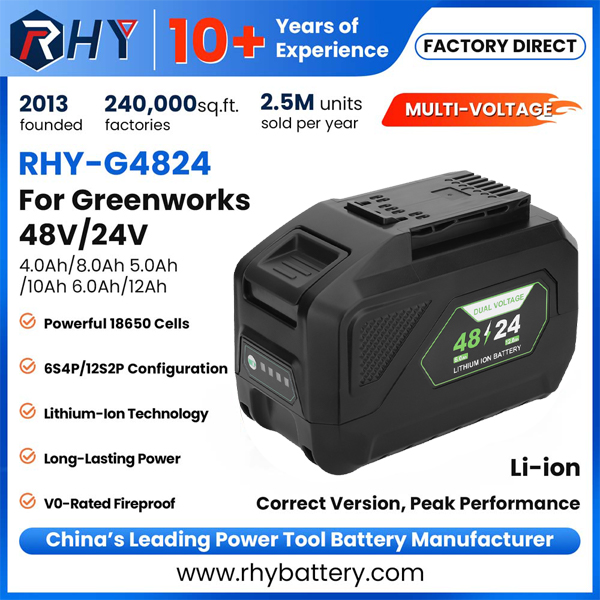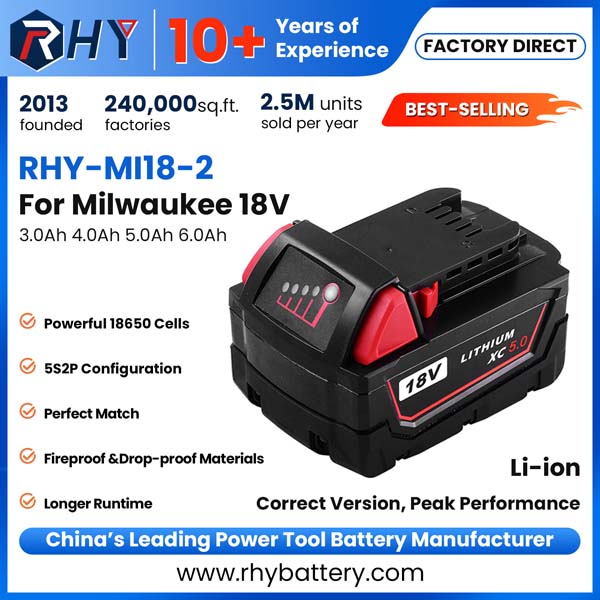News
Site Editor
 Site
/uploads/image/61e7a5cca4d32.png
Lithium-ion batteries have become a cornerstone of modern power solutions, providing efficient, compact, and reliable energy storage for various applications.
Site
/uploads/image/61e7a5cca4d32.png
Lithium-ion batteries have become a cornerstone of modern power solutions, providing efficient, compact, and reliable energy storage for various applications.
Comprehensive Guide: Understanding the Differences Between IMR, ICR, INR, and IFR 18650 Batteries
Views: 850
Author: Site Editor
Publish Time: 2024-10-28
Origin: Site
Lithium-ion batteries have become a cornerstone of modern power solutions, providing efficient, compact, and reliable energy storage for various applications. Among the most widely used configurations are the 18650 batteries, which come in several chemistries, including IMR, ICR, INR, and IFR. Each type has its unique advantages, disadvantages, and applications, making them suitable for different use cases. In this guide, we'll break down the key differences between these types of 18650 batteries, with a particular emphasis on their applications, performance, and how custom lithium-ion battery solutions play a crucial role in meeting specific needs.
1. IMR 18650 Battery (Lithium Manganese Oxide)
Chemical Composition:
IMR 18650 batteries use lithium manganese oxide (LiMn2O4) as the cathode material. This chemistry gives the batteries several distinct properties that are ideal for high-drain applications.
Advantages:
-
High Discharge Rate: IMR batteries can handle high discharge currents due to their lower internal resistance. This makes them well-suited for devices that require short bursts of power, such as vape mods or high-powered flashlights.
-
Better Thermal Stability: The manganese oxide structure offers better thermal stability, which means these batteries can operate safely under higher temperatures, reducing the risk of overheating.
-
Reduced Risk of Thermal Runaway: Thanks to their chemical stability, IMR batteries have a lower risk of catastrophic failures compared to other chemistries.
Disadvantages:
-
Lower Energy Density: One drawback of IMR batteries is their relatively lower energy density compared to other 18650 variants, which can limit their overall capacity and battery life. This makes them less ideal for low-power, long-term applications.
Applications:
-
Vape Mods: IMR batteries are popular in vaping devices for their ability to provide rapid bursts of power.
-
Portable Lighting: High-powered flashlights and portable lighting systems benefit from the quick discharge capabilities of IMR batteries.
-
Power Tools: Tools like drills and saws that demand short, powerful energy bursts use IMR cells due to their high-drain capacity.

2. ICR 18650 Battery (Lithium Cobalt Oxide)
Chemical Composition:
ICR 18650 batteries rely on lithium cobalt oxide (LiCoO2) as their cathode material, offering a high energy density but with safety concerns in high-drain conditions.
Advantages:
-
High Energy Density: ICR batteries can store more energy than other 18650 types, making them suitable for applications that require large capacities.
Disadvantages:
-
Safety Risks: The cobalt oxide chemistry is less stable, especially under high drain or high-temperature scenarios. This makes them more susceptible to overheating and requires careful management to avoid safety issues.
-
Lower Discharge Rate: ICR batteries discharge more slowly, making them less ideal for high-drain applications where quick power is needed.
Applications:
-
Consumer Electronics: Laptops, digital cameras, and other portable devices benefit from the higher capacity provided by ICR batteries.
-
Low-Drain Devices: ICR cells are ideal for devices that need consistent, long-term power delivery, such as medical devices or low-power flashlights.
3. INR 18650 Battery (Lithium Nickel Manganese Cobalt Oxide)
Chemical Composition:
INR batteries use a mix of nickel, manganese, and cobalt oxides (NMC) for their cathode material, striking a balance between safety, capacity, and discharge rates.
Advantages:
-
High Energy Density: INR batteries offer a good balance of high capacity and stable performance.
-
Enhanced Safety: NMC chemistry provides greater thermal stability and lowers the risk of thermal runaway, making INR batteries safer compared to ICR variants.
-
Balanced Performance: INR batteries offer a solid mix of energy density, discharge rates, and safety features, making them highly versatile.
Disadvantages:
-
Cost: Due to the advanced chemistry used, INR batteries are often more expensive than their IMR or ICR counterparts.
Applications:
-
Electric Vehicles (EVs): INR batteries are widely used in EVs, where their balance of performance, safety, and capacity is crucial.
-
Power Tools: INR cells can power tools that need a mix of long-lasting performance and high power output.
-
Portable Electronics: Devices that require high energy storage but also need a safe and reliable power source often use INR batteries.

4. IFR 18650 Battery (Lithium Iron Phosphate)
Chemical Composition:
IFR batteries, also known as lithium iron phosphate (LiFePO4) batteries, are known for their stability and safety, making them ideal for applications where longevity and reliability are paramount.
Advantages:
-
Superior Safety: IFR batteries are one of the safest lithium-ion chemistries available, with minimal risk of thermal runaway or overheating.
-
Long Lifespan: IFR batteries can endure more charge and discharge cycles compared to other 18650 types, making them cost-effective over time.
-
Good Discharge Capabilities: While they don’t have the highest energy density, IFR batteries still provide reliable power for many applications.
Disadvantages:
-
Lower Energy Density: IFR cells have a lower energy density than most other 18650 batteries, which limits their usage in applications that need high energy storage.
Applications:
-
Electric Bicycles: The safety and longevity of IFR batteries make them well-suited for electric bicycles.
-
Solar Energy Storage: IFR batteries are used in solar power systems due to their stability and long-term reliability.
-
Emergency Lighting: Their durability and safety features make IFR batteries an excellent choice for emergency lighting systems.
Differences in Applications
|
Factor
|
IMR
|
ICR
|
INR
|
IFR
|
|
Energy Density
|
Moderate
|
Highest
|
Moderate
|
Lower
|
|
Safety
|
High
|
Lower
|
High
|
Highest
|
|
Discharge Rate
|
High
|
Lower
|
High
|
Moderate
|
|
Cycle Life
|
Moderate
|
Long
|
Moderate
|
Longest
|
|
Capacity
|
Lower
|
Highest
|
Moderate
|
Moderate
|
|
Cost
|
Moderate
|
Highest
|
Moderate
|
Lower
|
|
Applications
|
High-drain apps
|
Consumer electronics
|
Electric vehicles, power tools
|
Safety-critical, energy storage
|
Custom Lithium-Ion Battery Solutions
One of the advantages of modern lithium-ion battery technology is the ability to customize solutions for specific applications. In China, lithium-ion battery manufacturers have become leaders in offering tailored battery solutions to meet the unique requirements of various industries.
Benefits of Custom Batteries:
-
Tailored Specifications: Custom lithium-ion batteries can be designed to meet specific voltage, capacity, and size requirements, ensuring they perform optimally for their intended use.
-
Enhanced Performance: By optimizing the battery’s internal design, manufacturers can extend its lifespan, improve energy efficiency, and enhance safety features.
-
Innovative Designs: Custom battery solutions can incorporate advanced features like increased energy density or additional safety mechanisms, depending on the application.
Applications of Custom Batteries:
-
Medical Devices: Custom lithium-ion batteries ensure that medical equipment operates with reliable and long-lasting power sources.
-
Consumer Electronics: Custom batteries can be optimized for smartphones, laptops, and other electronics, offering better performance and longer battery life.
-
Industrial Equipment: Custom batteries for industrial applications provide the durability and high performance necessary in demanding environments.
Conclusion
Understanding the differences between IMR, ICR, INR, and IFR 18650 batteries is crucial for selecting the right battery for any application. Whether it's the high discharge rates of IMR, the high energy density of ICR, the balanced performance of INR, or the exceptional safety of IFR, each battery type has its place in today’s technology-driven world.
For customized and high-performance battery solutions tailored to your specific needs, trust RHY—China’s leading lithium battery manufacturer. RHY is committed to delivering reliable, safe, and efficient energy solutions.Our expansive product range includes cutting-edge power tool batteries, garden tool batteries, vacuum cleaner batteries, electric bike batteries, portable power stations, battery chargers, and an array of other innovative solutions. At RHY Battery, we're dedicated to powering your devices with reliability, performance, and sustainability in mind.

